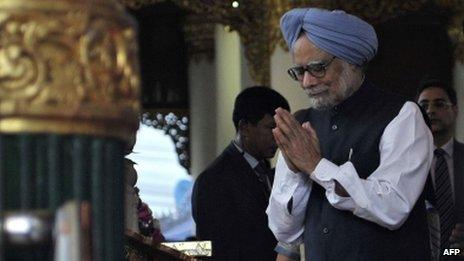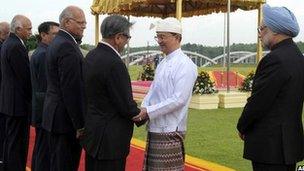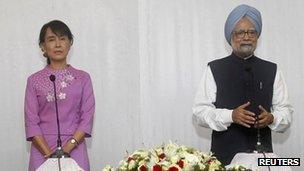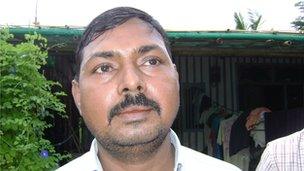India seeks wider footprint in 'untapped' Burma
- Published

Counting on trust: Indian Prime Minister Manmohan Singh visted Burma seeking to bolster political and economic ties
"India is the world's largest democracy. So then why doesn't it support Aung San Suu Kyi?"
The indignant words were delivered by a Burmese taxi driver but could well have represented the feelings of many in Rangoon.
He would have got his answer just a few hours later.
"It's my sincere hope that Aung San Suu Kyi will play a defining role in the process of national reconciliation undertaken by President Thein Sein."
It was a carefully worded statement from Indian Prime Minister Manmohan Singh after he emerged from a closed-door meeting with Ms Suu Kyi.
It captured India's approach to a country which has only just emerged from years of international isolation - to build strong ties with the current military-backed government while keeping the lines of communication open with Ms Suu Kyi, who could some day become an even bigger political player.

Some wealthy Indian businesmen accompanied Mr Singh to Burma where he met President Thein Sein.
Mr Singh's two-day visit, the first by an Indian premier in 25 years, was aimed at strengthening both political and economic links with its neighbour.
Access to Burma's untapped reserves of oil and gas is something that India, like many other countries, is keen to gain.
"We believe there is huge potential here," says Indian Foreign Secretary Ranjan Mathai.
"You get a sense of that just from the number of other countries who have shown interest here."
'Reclaim our territory'
The feeling of urgency, of not losing out to others, is something that was very evident in the large Indian delegation, in both the new capital Naypidaw and the colonial-era city of Rangoon.
"Many Indian businesses have been here for years," said Sunil Mittal, Chairman of Indian telecom giant Bharti Mittal and one of a number of top business leaders to have accompanied the prime minister.

Mr Singh said he hoped Ms Suu Kyi would play a 'major role in the political process' in Burma
"I believe that before the West descends in a big way, it's time to reclaim our territory."
Advice that was clearly taken to heart by many.
Knots of Indian businessmen in crisp suits could be seen gathered at Rangoon's top hotels, slipping in and out of gleaming limousines.
There were some who wondered if they'd left it too late. After all many Western companies as well as Japanese and Korean firms have already been in and signed big deals.
But the Indians are confident.
"The West has only just discovered Myanmar [Burma]," one Indian diplomat told me.
"We've been around for decades. And we're trusted."
It's these historical and cultural links that India is banking on.
'Kyaw Swe'
Burma has a large Indian community. Estimates of the number range from two to three million.

Hari Shankar's great-grandfather arrived in Burma from India 150 years ago
Most of them live in the countryside but there are a sizeable number in the cities, working as traders.
I caught up with Hari Shankar and his family in their two-room home on the edge of Rangoon.
His family were gathered around a television set, watching a Bollywood release while pictures of Hindu gods adorned the mantelpiece.
"My great-grandfather migrated from Bihar 150 years ago," he told me.
"Since then we've been here. I have a small business in selling lentils."
Like many Indians, he uses his Burmese name - Kyaw Swe. His Indian name is reserved for the family.
"It's easier that way," he says smiling. "Besides, none of us has ever been to India."
Despite that, the whole family is fluent in Hindi and familiar with Indian customs.
Burma's Indians are hoping that the prime minister's visit delivers what it set out to do - build closer links between the two countries by increasing road and air links.
India too wants this to happen - one of the major projects it is pursuing is the Trilateral Highway, linking its north-eastern states to Burma all the way to Thailand.
"It's my hope that this project will be completed by 2016," said Manmohan Singh in an address to Burmese business leaders.
For India, Burma is its link to the rest of Asia. As for Burma, India is a useful friend which can be used to balance the other regional player, China.
For now, it is mutually beneficial to both to get along and do business.
- Published29 May 2012
- Published29 May 2012